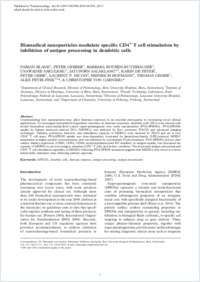Biomedical nanoparticles modulate specific CD4+ T cell stimulation by inhibition of antigen processing in dendritic cells
- Blank, Fabian Department of Clinical Research, Division of Pulmonology, University Hospital, Bern, Switzerland
- Gerber, Peter Department of Clinical Research, Division of Pulmonology, University Hospital, Bern, Switzerland
- Rothen-Rutishauser, Barbara Institute of Anatomy, Division of Histology, University of Bern, Switzerland
- Sakulkhu, Usawadee Powder Technology Laboratory, École Polytechnique Fédérale de Lausanne, Switzerland
- Salaklang, Jatuporn Powder Technology Laboratory, École Polytechnique Fédérale de Lausanne, Switzerland - Department of Chemistry, University of Fribourg, Switzerland
- Peyer, Karin De Department of Clinical Research, Division of Pulmonology, University Hospital, Bern, Switzerland
- Gehr, Peter Institute of Anatomy, Division of Histology, University of Bern, Switzerland
- Nicod, Laurent P. Division of Pulmonology, University Hospital, Lausanne, Switzerland
- Hofmann, Heinrich Powder Technology Laboratory, École Polytechnique Fédérale de Lausanne, Switzerland
- Geiser, Thomas Department of Clinical Research, Division of Pulmonology, University Hospital, Bern, Switzerland
- Petri-Fink, Alke Powder Technology Laboratory, École Polytechnique Fédérale de Lausanne, Switzerland - Department of Chemistry, University of Fribourg, Switzerland
- Garnier, Christophe von Department of Clinical Research, Division of Pulmonology, University Hospital, Bern, Switzerland
-
2011
Published in:
- Nanotoxicology. - 2011, vol. 5, no. 4, p. 606-621
English
Understanding how nanoparticles may affect immune responses is an essential prerequisite to developing novel clinical applications. To investigate nanoparticle-dependent outcomes on immune responses, dendritic cells (DCs) were treated with model biomedical poly(vinylalcohol)-coated super-paramagnetic iron oxide nanoparticles (PVA-SPIONs). PVA-SPIONs uptake by human monocyte-derived DCs (MDDCs) was analyzed by flow cytometry (FACS) and advanced imaging techniques. Viability, activation, function, and stimulatory capacity of MDDCs were assessed by FACS and an in vitro CD4⁺ T cell assay. PVA-SPION uptake was dose-dependent, decreased by lipopolysaccharide (LPS)-induced MDDC maturation at higher particle concentrations, and was inhibited by cytochalasin D pre-treatment. PVA-SPIONs did not alter surface marker expression (CD80, CD83, CD86, myeloid/plasmacytoid DC markers) or antigen-uptake, but decreased the capacity of MDDCs to process antigen, stimulate CD4⁺ T cells, and induce cytokines. The decreased antigen processing and CD4⁺ T cell stimulation capability of MDDCs following PVA-SPION treatment suggests that MDDCs may revert to a more functionally immature state following particle exposure.
- Faculty
- Faculté des sciences et de médecine
- Department
- Département de Chimie
- Language
-
- English
- Classification
- Biological sciences
- License
-
License undefined
- Identifiers
-
- RERO DOC 21694
- DOI 10.3109/17435390.2010.541293
- Persistent URL
- https://folia.unifr.ch/unifr/documents/301827
Statistics
Document views: 110
File downloads:
- pdf: 172
